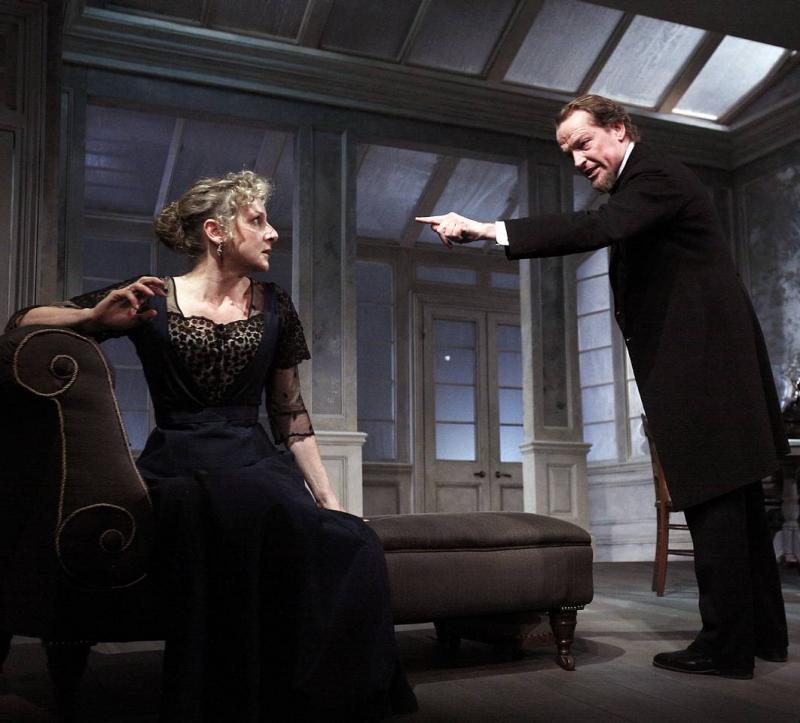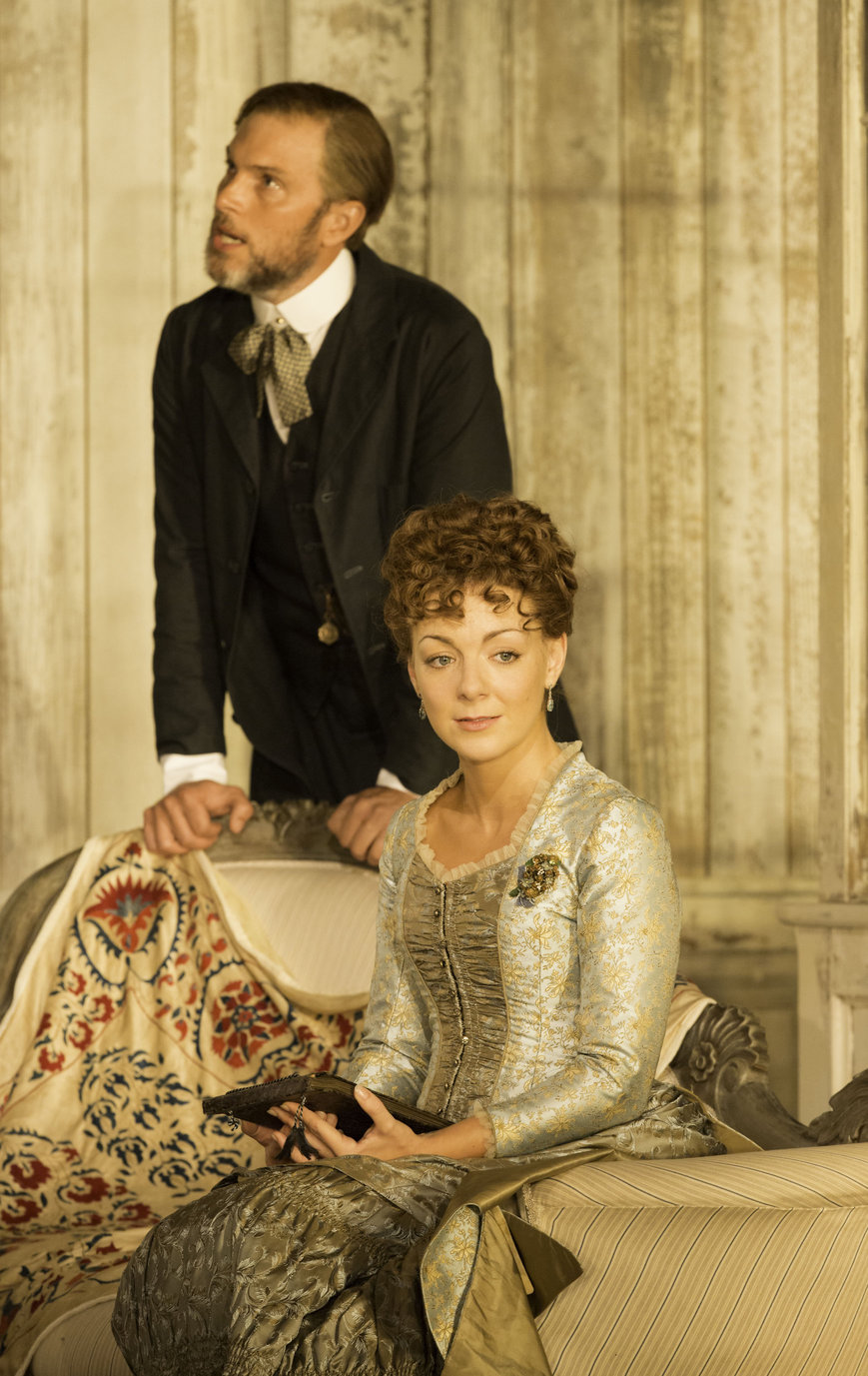Ghosts, Duchess Theatre | reviews, news & interviews
Ghosts, Duchess Theatre
Ghosts, Duchess Theatre
Iain Glen makes directorial debut with a straightforward take on Ibsen

It is difficult for modern audiences to appreciate just how shocking Henrik Ibsen’s Ghosts was when it was first published in 1881. Its sexual and syphilitic storyline - how the sins of the fathers are visited upon their sons - was considered immoral, loathsome even, and audiences must have felt deeply uncomfortable watching their Victorian, Christian hypocrisies laid bare. So how to make Ghosts relevant to today’s theatregoers?
In Frank McGuinness’s rather pedestrian version, much of the play’s moral outrage becomes incidentally comic - a reference to unmarried couples living together brings forth a heated “Filth!” from the upright Pastor Manders (Iain Glen, here also making his directorial debut). And what is a coda to the original play - Oswald’s plea to be assisted in his suicide by his mother when his syphilis takes fatal hold - here leaps straight out of today’s news pages and documentaries. But the heart of the play remains the burdens of duty - to God, husbands, parents, children - that weigh heavily on each of Ibsen’s characters, and in Glen’s straightforward and often static production we see the dangers of secrets and lies within the family.
We are in the rainy Norwegian fjords, where Mrs Alving (Lesley Sharp) is preparing for the opening of an orphanage that will be a memorial to her late husband. Her son, Oswald (Harry Treadaway), an artist, returns home as she discusses the celebrations with the sermonising Manders. Mrs Alving is keen to lay the ghost of her husband, Captain Alving, who died 10 years before, and we learn that as a newlywed she realised she had married a dissolute man and left him. She sought refuge with Pastor Manders, who made her return to him because, he said, it was her wifely duty. But in taking the advice - from her priest, or her putative lover, we are never clear - Mrs Alving inadvertently caused the events that now, more than 20 years later, unfold catastrophically.
Having been sent home, Mrs Alving sacrificed her happiness to create the fiction of a happy family. In trying to protect him from the horrible reality of his father’s whoring, she sent Oswald away, but kept her husband’s bastard child close at hand as her servant. And now, as Oswald, who himself has led a bohemian life in Paris, falls for his half-sister, the truth finally comes out.
Glen gives a nuanced performance as the Pastor, suggesting the vulnerabilities - sexual thoughts, too - that lie beneath the brimstone, although he delivers his lines with an extraordinary accent that starts in Cornwall and meanders to Scotland by way of Lancashire. Sharp, fresh from The Rise and Fall of Little Voice elsewhere in the West End, gives another compelling performance, while solid support comes from Malcolm Storry as the cynical carpenter Engstrand and Jessica Raine as the opportunistic maid Regine. Treadaway gives an actorly portrayal of Oswald - one moment the fey artist, the next a twitching syphilitic - that underwhelmed me.
Stephen Brimson Lewis’s design, with lighting by Oliver Fenwick, is all ice whites and blues, and expertly mirrors the coldness of this house of ghosts.
MORE IBSEN ON THEARTSDESK
The Master Builder, Almeida Theatre (2010). Passions blow hot and cold in this uneven production starring Gemma Arterton and Stephen Dillane
Emperor and Galilean, National Theatre (2011). Power and pace help to exhume Ibsen's Romano-Christian epic starring Andrew Scott
Judgement Day, The Print Room (2011). Ibsen's last play has its issues but emerges strongly in new adaptation with Michael Pennington
The Lady From the Sea, Rose Theatre, Kingston (2012). Joely Richardson takes on the Ibsen heroine her mother and sister made their own
A Doll's House, Young Vic (2012). Period setting yields a contemporary tragedy adapted by Simon Stephens and starring Hattie Morahan
 Hedda Gabler, Old Vic (2012). Ibsen's heroine draws new depths from the West End's sweetheart Sheridan Smith (pictured)
Hedda Gabler, Old Vic (2012). Ibsen's heroine draws new depths from the West End's sweetheart Sheridan Smith (pictured)
Love's Comedy, Orange Tree Theatre (2012). Early Ibsen finds the playwright in his awkward adolescence
A Doll's House, Royal Exchange (2013). Ibsen in the round loses none of its power to cast a spell
Public Enemy, Young Vic (2013). The horrors of local politics still chime in Richard Jones's queasy production of an Ibsen masterpiece
Ghosts, Almeida Theatre (2013). Richard Eyre and Lesley Manville shine light into Ibsen's dark thriller of family misfortunes
Peer Gynt, Théâtre National de Nice (2014). Irina Brook's song-and-dance Ibsen entertains, but misses the darker shades
The Wild Duck, Belvoir Sydney (2014). Heartbreaking adaptation mixes naturalism and forensic examination
Little Eyolf, Almeida Theatre (2015). Strong women and one weak man in Ibsen's swift study of isolation and guilt
The Master Builder, Old Vic (2016). Ralph Fiennes stars in Ibsen's unsettling mix of the real and the supernatural
Hedda Gabler, National Theatre (2016). Ivo van Hove makes an uneven Southbank debut
The future of Arts Journalism
You can stop theartsdesk.com closing!
We urgently need financing to survive. Our fundraising drive has thus far raised £49,000 but we need to reach £100,000 or we will be forced to close. Please contribute here: https://gofund.me/c3f6033d
And if you can forward this information to anyone who might assist, we’d be grateful.

Subscribe to theartsdesk.com
Thank you for continuing to read our work on theartsdesk.com. For unlimited access to every article in its entirety, including our archive of more than 15,000 pieces, we're asking for £5 per month or £40 per year. We feel it's a very good deal, and hope you do too.
To take a subscription now simply click here.
And if you're looking for that extra gift for a friend or family member, why not treat them to a theartsdesk.com gift subscription?
more Theatre
 Tom at the Farm, Edinburgh Fringe 2025 review - desire and disgust
A visually stunning stage re-adaptation of a recent gay classic plunges the audience into blood and earth
Tom at the Farm, Edinburgh Fringe 2025 review - desire and disgust
A visually stunning stage re-adaptation of a recent gay classic plunges the audience into blood and earth
 Works and Days, Edinburgh International Festival 2025 review - jaw-dropping theatrical ambition
Nothing less than the history of human civilisation is the theme of FC Bergman's visually stunning show
Works and Days, Edinburgh International Festival 2025 review - jaw-dropping theatrical ambition
Nothing less than the history of human civilisation is the theme of FC Bergman's visually stunning show
 Every Brilliant Thing, @sohoplace review - return of the comedy about suicide that lifts the spirits
Lenny Henry is the ideal ringmaster for this exercise in audience participation
Every Brilliant Thing, @sohoplace review - return of the comedy about suicide that lifts the spirits
Lenny Henry is the ideal ringmaster for this exercise in audience participation
 Edinburgh Fringe 2025 reviews: The Beautiful Future is Coming / She's Behind You
A deft, epoch-straddling climate six-hander and a celebration (and take-down) of the pantomime dame at the Traverse Theatre
Edinburgh Fringe 2025 reviews: The Beautiful Future is Coming / She's Behind You
A deft, epoch-straddling climate six-hander and a celebration (and take-down) of the pantomime dame at the Traverse Theatre
 Good Night, Oscar, Barbican review - sad story of a Hollywood great's meltdown, with a dazzling turn by Sean Hayes
Oscar Levant is an ideal subject to refresh the debate about media freedom
Good Night, Oscar, Barbican review - sad story of a Hollywood great's meltdown, with a dazzling turn by Sean Hayes
Oscar Levant is an ideal subject to refresh the debate about media freedom
 Edinburgh Fringe 2025 reviews - Monstering the Rocketman by Henry Naylor / Alex Berr
Tabloid excess in the 1980s; gallows humour in reflections on life and death
Edinburgh Fringe 2025 reviews - Monstering the Rocketman by Henry Naylor / Alex Berr
Tabloid excess in the 1980s; gallows humour in reflections on life and death
 Edinburgh Fringe 2025 reviews: Lost Lear / Consumed
Twists in the tail bring revelations in two fine shows at the Traverse Theatre
Edinburgh Fringe 2025 reviews: Lost Lear / Consumed
Twists in the tail bring revelations in two fine shows at the Traverse Theatre
 Make It Happen, Edinburgh International Festival 2025 review - tutting at naughtiness
James Graham's dazzling comedy-drama on the rise and fall of RBS fails to snarl
Make It Happen, Edinburgh International Festival 2025 review - tutting at naughtiness
James Graham's dazzling comedy-drama on the rise and fall of RBS fails to snarl
 Edinburgh Fringe 2025 reviews: I'm Ready To Talk Now / RIFT
An intimate one-to-one encounter and an examination of brotherly love at the Traverse Theatre
Edinburgh Fringe 2025 reviews: I'm Ready To Talk Now / RIFT
An intimate one-to-one encounter and an examination of brotherly love at the Traverse Theatre
 Top Hat, Chichester Festival Theatre review - top spectacle but book tails off
Glitz and glamour in revived dance show based on Fred and Ginger's movie
Top Hat, Chichester Festival Theatre review - top spectacle but book tails off
Glitz and glamour in revived dance show based on Fred and Ginger's movie
 Edinburgh Fringe 2025 reviews: Alright Sunshine / K Mak at the Planetarium / PAINKILLERS
Three early Fringe theatre shows offer blissed-out beats, identity questions and powerful drama
Edinburgh Fringe 2025 reviews: Alright Sunshine / K Mak at the Planetarium / PAINKILLERS
Three early Fringe theatre shows offer blissed-out beats, identity questions and powerful drama
 The Daughter of Time, Charing Cross Theatre review - unfocused version of novel that cleared Richard III
The writer did impressive research but shouldn't have fleshed out Josephine Tey’s story
The Daughter of Time, Charing Cross Theatre review - unfocused version of novel that cleared Richard III
The writer did impressive research but shouldn't have fleshed out Josephine Tey’s story

Add comment